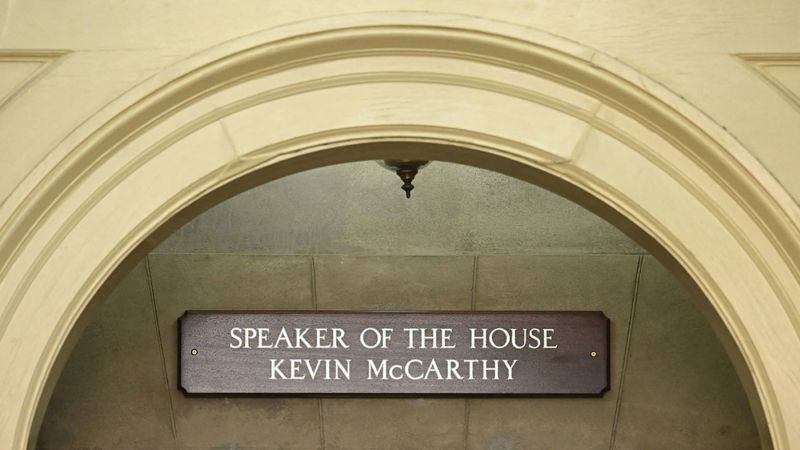
CNN
—
Getting rid of Kevin McCarthy didn’t solve anything.
Whoever succeeds the former House speaker will need to defuse the hazardous and self-defeating political forces inside the Republican conference that made McCarthy’s tenure, in a job he’d sought for years, so abbreviated.
Two candidates, GOP Majority Leader Steve Scalise of Louisiana and Judiciary Chairman Jim Jordan of Ohio, have already launched campaigns. Rep. Kevin Hern of Oklahoma is gauging support for a possible run for leadership and others may also jump in. A new speaker with a fresh start may be better positioned than McCarthy, who was battered by years of battles as minority leader, to bring the party together. But unless the eventual new speaker addresses the intractable root causes of McCarthy’s downfall, their time in the speaker’s chair may be as short-lived as his was.
And the new speaker will face a massive test within weeks of taking office – and the same tough dilemmas that felled McCarthy – when the short-term funding bill that was the former speaker’s last act expires next month and the government is again in danger of shutting down.
The next person to wield what turned out to be a poisoned gavel for the Californian will surely try to change how the Republican majority works to avoid also dooming their own speakership from the start. Any candidate would be unwise to repeat the concession McCarthy made to hardliners as a last resort in 15 rounds of balloting for the job earlier this year, which allowed a single member of the House to file a motion to oust him.
Florida Rep. Matt Gaetz, McCarthy’s chief tormentor, wielded the possibility of a so-called motion to vacate over McCarthy’s head for weeks and showed why previous speakers, including Democrat Nancy Pelosi, always resisted making the concession that McCarthy did.
One of McCarthy’s top allies, Rep. Garret Graves of Louisiana, told CNN’s Jake Tapper on Wednesday that leaving a speaker under the constant threat of being dismissed by his own party would be detrimental to the national interest.
“We don’t subject the president or the vice president to that type of low threshold. The United States needs to have more stability than we saw yesterday,” Graves said.
But the political storm that swept McCarthy away was not simply the product of his own missteps, ill-advised concessions to hardliners or even the riotous nature of the Republican Party in the era of Donald Trump, in which there are often stronger incentives for members to perform stunt politics to catch the eye of producers on right-wing TV shows than there are to actually pursue conservative policies.
The next speaker will have to find a way to deal with those in the GOP who set themselves up as the true arbiters of conservatism and prioritize disruption and confrontation over governance. Many of these members come from deep red districts that are often gerrymandered to head off competitive general elections, so their only real electoral threat may come from more extreme members of their party in a primary.
The outgoing speaker implicitly referred to his own, and his party’s, failure to so far show voters that they can effectively run the country ahead of the 2024 election in his farewell news conference just after he was ousted on Tuesday night. “I want to be a Republican and a conservative who governs. And we’re going to have to find a way to do that,” McCarthy said.
He’s not the first GOP speaker to think so. Former Speaker John Boehner was swept to power on a Tea Party revolution, but ultimately could not deal with the absolutism of the far-right that caused government shutdowns and fiscal cliffs, and he was eventually driven to distraction – and resignation – by his impossible task. The next Republican speaker, former Wisconsin Rep. Paul Ryan, was seen as having the capacity to appeal to all wings of his party. But he too was crushed by the challenge and was also driven out of politics by the refusal of some of his conference’s most extreme members to permit the compromise that is inherent to the US political system. Ryan also had to cope with his ideological conservatism being overtaken by the “America First” cultural warfare and fiscal profligacy of Trump when he transformed the party into a vehicle for his populist nationalism during his 2016 presidential run.
McCarthy’s successor will also confront a reality that will not change at least until the 2024 election – the tiny GOP majority that is both a major impediment to the Republican conference’s legislative potential and provides extremist flamethrowers with significant leverage.
Because GOP leaders can only lose four votes and still pass a bill on a party-line whip, some critical measures often can only be passed by winning some support from Democrats. McCarthy had to resort to this strategy to avoid a government shutdown and a debt default this year. But in this political climate, any Republican speaker who has to rely on Democratic votes is critically weakened and probably can’t last long.
The failure of Republicans to deliver on what McCarthy had predicted would be a “red wave” landslide in last year’s midterm elections also directly contributed to his demise. The mathematics of the House made it impossible for McCarthy to reach majority support to retain the speakership, even though only eight Republicans voted with Democrats to oust him. If he’d even managed to get a 10-seat majority, let alone the 30 or 40 seats he was expecting last year, he would have survived.
While the next speaker will have to watch their right flank, they’d be wise not to ignore the more moderate wing of the party that includes members furious at the ouster of McCarthy – not least because he boosted many of their campaigns with his prodigious fundraising. Even more importantly, more than a dozen Republicans who won in swing districts in 2022 could see their reelection hopes disappear if chaos in the House provokes voter fury.
Rep. Mike Lawler, a Republican who won a New York district that Biden would have won by 10 points in 2020 under the new lines, is calling for Gaetz to be expelled from the Republican conference. The freshman warned on Wednesday that voters needed to see his party return to tackling the southern border, reining in spending and confronting threats from Russia and China.
“The American people expect us to govern,” Lawler told CNN’s Wolf Blitzer, urging his party to come together quickly next week in choosing a new speaker. “They expect us to get our big boy pants on and come to an agreement.”
Then there is the huge factor that no Republican speaker or party figure has ever been able to control: Trump. While the ex-president remains popular among GOP grassroots voters, and therefore can exert heavy influence on Republican lawmakers who try to emulate his chaotic brand of politics, his antics – not to mention multiple criminal indictments – threaten to alienate the same kind of swing voters that Lawler and his colleagues are counting on for their reelection.
Another headache for the new Republican speaker, who the party is hoping to have in place next week, will be the White House request for around $20 billion in new funding for Ukraine’s fight against Russia’s unprovoked invasion. It was a tough lift even under McCarthy, who voted in favor of the arms and ammunition pipeline for Kyiv even if he raised concerns about how the money was being spent and hardened his attitude as much of his party turned against the money.
Jordan said publicly in an interview with CNN’s Manu Raju Wednesday that he was opposed to Ukraine aid, warning that Americans care most about crime and the southern border. (His fellow Republican, Foreign Affairs Chairman Michael McCaul, told Raju that Jordan didn’t completely rule out Ukraine aid during a Wednesday meeting with the Texas delegation, but that border security would have to be part of the negotiation.) Scalise has been largely supportive of aid. But any candidate for speaker may face demands from scores of Republicans who don’t want to send more money. In the most recent vote on sending aid to Ukraine in late September, which was over a comparatively small $300 million tranche, 117 Republicans – more than half the party’s conference – voted against it.
The world can look a lot different from the speaker’s chair, which brings loftier responsibilities as second in line to the presidency than the political trenches in the House. But the only way a Republican speaker will be able to pass aide to Ukraine will be to do so with Democratic help. This is why McCarthy did not include a $6 billion down payment on Biden’s wider aid request in the legislation that averted a government shutdown on Saturday, saying that such funds would only be forthcoming in a wider package that also financed greater security on the southern border.
But creative solutions along those lines require Republican Party factions to be willing to dilute their purist positions for its wider good. The lack of such flexibility has been a fatal flaw of GOP speakers for years.

